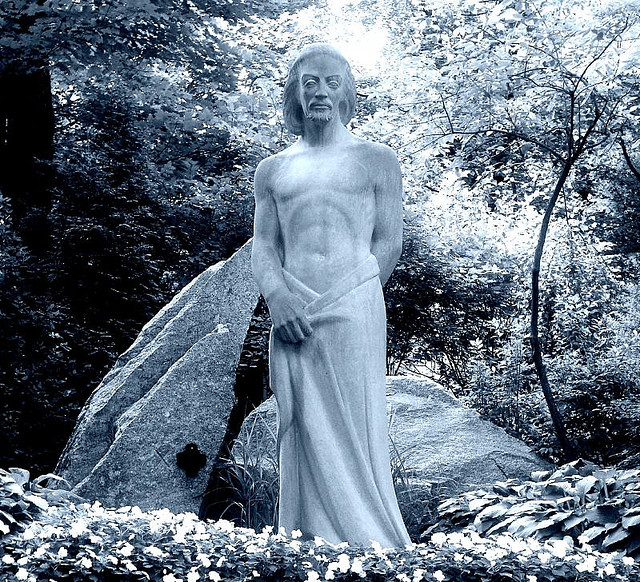I started reading a book yesterday called Contemplative Practices in Action: Spirituality, Meditation, and Health. It’s an academic volume which seeks to demonstrate that contemplative practices have positive affects on the lives of those who engage in them. It’s of personal interest to me for a number of reasons.
First, I would like to see an emergence of a contemplative stream of Pagan practice. I would like to see Pagans, through the lenses of their traditions, build and develop contemplative practices that are both true to their community identity, but also examples of how the Pagan ethea is relevant in the modern world. To some whose tradition already incorporates contemplative-style activities in their group work this shouldn’t seem like much of a stretch. But I’m not sure if they’re identifying what they’re doing as “contemplative practice.”
But aside from my conviction that the modern Pagan movement needs more contemplatives, I was drawn to this book because I feel a need to enrich my own contemplative practice. My writing in recent days has been centered around my own inquiries and doubts, but the current running underneath all of it is a desire to have a deeper and more fulfilling contemplative life.
For an academic text rich with footnotes and references, I was surprised at how quickly I started in on this book. The second chapter, Similarity in Diversity? Four Shared Functions of Integrative Contemplative Practice Systems spelled out a few ideas that immediately made me think about ADF and my Dedicant Path studies (which, truth be told, have all but been ignored over the past long while). The author, Doug Oman, looks at a variety of systems, including The Eight-Point Program of Passage Meditation, Centering Prayer, and Mantra Repetition and outlines four elements or themes present in most of them. A practice system, he asserts, could be considered an integrated contemplative practice if it contains these four common elements:
1. Set-aside time–time that is set aside regularly, usually daily, for a disciplined activity or exercise that has a comparatively powerful effect on training attention.
2. Virtues and character strengths–qualities of character and behavior, such as compassion, forgiveness or fearlessness. … Typically, the recommended qualities involve subsets of six cross-culturally prevalent classes of virtues recently identified by positive psychologists–wisdom, courage, humanity, justice, temperance, and transcendence.
3. Practices for centering/stabilizing that are usable through the day–such as during occasions of stress, anxiety, or unstructured time.
4. Spiritual models–attending to the individuals whose behavior reflects desired spiritual qualities–provide a unique resource for spiritual growth. … Attending to spiritual models’ words and actions can motivate sustained practice, and guide or inspire implementation of other spiritual practices. (Oman 8)
(emphasis mine)
This last one, spiritual models, caught my attention.
We don’t have those, I though. Or, at least, I’m not sure there is one particular spiritual model set forth by my tradition to look to for inspiration or guidance. In fact, I’m sure that there isn’t.
I posed these questions on Facebook:
Are Pagan traditions offering the kind of “spiritual modeling” that you might find in, say, Buddhism or Christianity? Do we have spiritual figures — either from history or from myth (or in the fuzzy place in the middle) — that we regularly look to for examples of how to act in the world? If so, who are these folk?
Who do *you* look to for “spiritual modeling”?
The responses were interesting.
Some look to figures like Marcus Aurelius, Epictetus, or Hypatia. Others see Crowley and Doreen Valiente as figures to look to (both in a historical and in a magickal sense). MLK was mentioned as was Malcolm X, the current Archdruid of ADF, and the heroes of Celtic legend.
Michael York asked, taking us to an archetypally pagan place, “Is not our ultimate spiritual model nature herself?”
All of these things were relevant to the people who offered them, but as I sit with these ideas now I realize that — for me — I need my #4 to be connected more closely to my #2: I need a spiritual model that demonstrates the virtues and character strengths that are meaningful to me.
In my time as Pagan, I’m not sure I’ve found that model.
As a Christian, Jesus was that model for me. While I was always a little uncomfortable by some of the language that accompanied the act of “following Jesus,” especially anything that ascribed to the person of Jesus attributes that seemed little more than projections of the follower, himself, I was still influenced by the example of this man. He was something concrete to look to, even if his life was represented in an incomplete and biased fashion. It was a point of reference, and that was valuable. He wasn’t important because of the “saved soul” factor; he was important because he made it easier for me, personally, to connect my actions to a system of values.
Some people who responded to my questions don’t look to anyone other than themselves. They are their own example; their own spiritual model.
While I respect everyone’s right to develop their religious and spiritual life as they see fit, I don’t think I can serve as my own best example. I need something to look to that is outside of myself, even if in the form of a character in a story or myth, in order to help me better understand the nuances of my own humanity.
The question is, who’s going to by my Pagan Jesus?

Leave a Reply